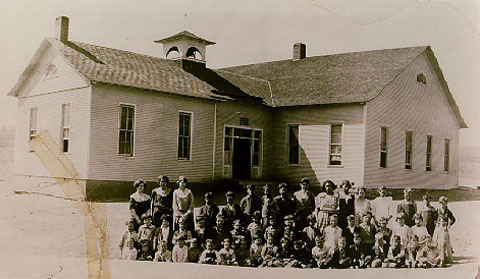Past and Current Projects
The Adaptive House
Boulder, Colorado

Since the mid 1940s, the home automation industry has promised to revolutionize our living environments. The so-called "smart home" has been hyped in the popular press. The vision of the industry is that household devices -- appliances, entertainment centers, temperature and lighting control units -- will behave intelligently. For example, the stereo might automatically switch on music as the occupants return home; the TV might lower its volume when the phone rings; or the clothes dryer might make an announcement over an intercom system when it has completed its cycle.
As attractive as this scenario is, the software for an automated home must be tailored to a particular home and family, and updated as the family's lifestyle changes. Tackling the programming task is far beyond the capabilities and interest of typical home inhabitants. Indeed, even rudimentary forms of regulation, such as operating a set back thermostat, are inordinately difficult for people. The alternative of hiring professional technicians to update programs as necessary is used in some commercial systems, but is costly and inconvenient. Partly due to the difficulties in programming, home automation has never become a widely available and accepted technology.
In contrast to standard computerized homes that can be programmed to perform various functions, the crux of our project is to develop a home that essentially programs itself by observing the lifestyle and desires of the inhabitants, and learning to anticipate and accommodate their needs. The system we have developed controls basic residential comfort systems -- HVAC (heating, ventilation, and air conditioning), water heater, and interior lighting. The system monitors the environment, observes the actions taken by occupants (e.g., turning up the thermostat; turning on a particular configuration of lights), and it attempts to infer patterns in the environment that predict these actions. If the actions can be reliably anticipated, the system can perform the actions automatically, freeing the occupants from manual control of the home. A secondary consideration of the system is to conserve energy resources, when possible.
We have constructed a prototype system in an actual residence (see photo above). The home laboratory is equipped with an array of over 75 sensors which provide information about the environmental conditions we are monitoring -- temperature, ambient light levels, sound, motion, door and window openings -- and actuators to control the furnace, space heaters, water heater, lighting units, and ceiling fans. (Click here to view status display of house, showing sensor and actuator locations.)
Control systems in the residence are based on neural network reinforcement learning and prediction techniques. Neural networks are artificial learning devices inspired by the workings of the human brain. These networks are made up of hundreds or thousands of simple neuron-like processing units, which, through their interactions, achieve complex behaviors, and have the ability to learn from experience.
Some examples of what the system can or eventually will do include: predicting when the occupants will return home and determining when to start heating the house so that a comfortable temperature is reached by the time the occupants arrive; detecting statistical patterns of water usage, such that hot water is seldom if ever used in the middle of the day on weekdays, allowing the water heater to shut off at those times; inferring where the occupant is and in what activities the occupant is engaged -- perhaps he is reading at the kitchen table -- and controlling lighting patterns and intensities accordingly, even anticipating which rooms are about to be entered and turning on the lights before the room becomes occupied.
By inferring ocupancy and usage
patterns in the home, the system can make life
more comfortable and conserve energy at the same time.
View press release on the Adaptive House
View photos of the Adaptive House
See java demo of Adaptive House
Slides from talk on Adaptive House
Videos demonstrating the lighting system
Mike being a dork on the HGTV show Extreme Homes
Romanian translation of this page
Russian translation of this page

